Duress, Undue Influence & Unconscionability: A Critical Analysis
VerifiedAdded on 2023/01/18
|12
|3547
|92
Essay
AI Summary
This essay provides a critical evaluation of duress and undue influence as legal doctrines in the context of unconscionable contracts. It explores how these concepts, which address situations where a party enters a contract under coercion or unfair pressure, relate to the broader issue of unconscionability, where one party takes advantage of another's weakness. The essay discusses relevant case law, such as David C. Builder ltd. v. Rees and Lloyds Bank Co. Ltd v Bundy, to illustrate the application of these principles. It also examines the differences and similarities between duress and undue influence, highlighting the focus of undue influence on the weakness of consent and the emphasis of unconscionability on the exploitation of that weakness. The essay concludes by advocating for the importance of laws against unconscionable bargains to prevent exploitative behavior and ensure fairness in contractual relationships.
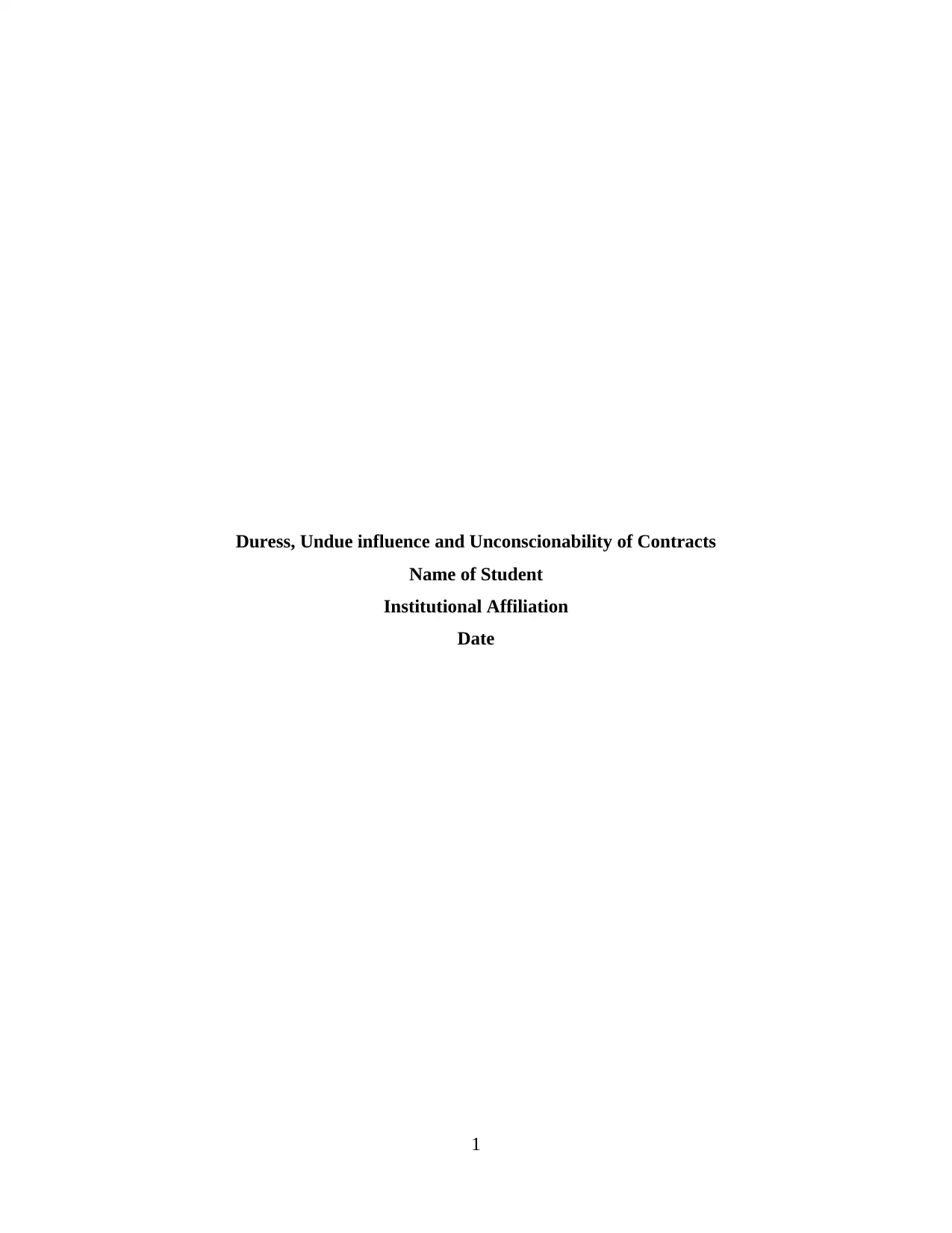
Duress, Undue influence and Unconscionability of Contracts
Name of Student
Institutional Affiliation
Date
1
Name of Student
Institutional Affiliation
Date
1
Paraphrase This Document
Need a fresh take? Get an instant paraphrase of this document with our AI Paraphraser
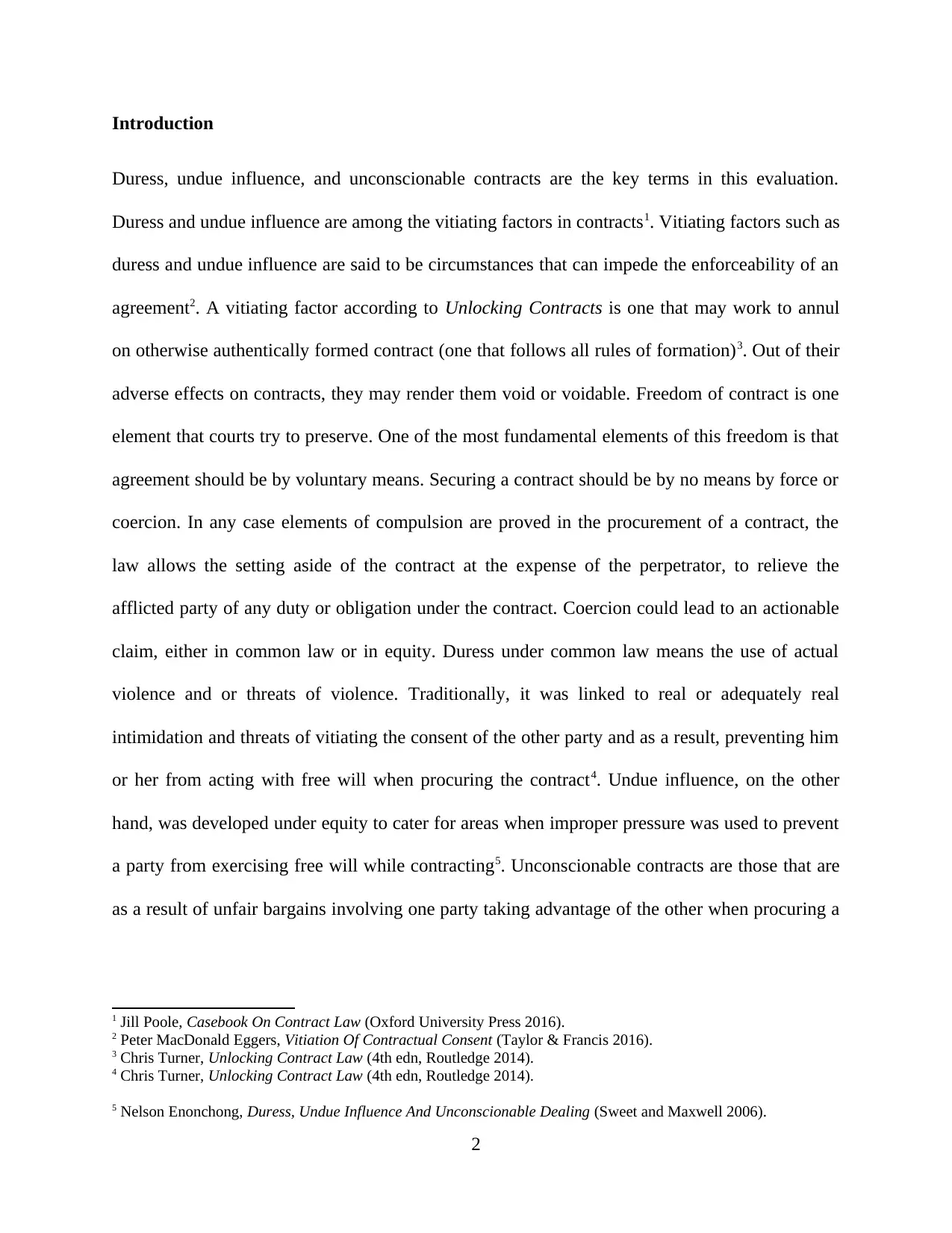
Introduction
Duress, undue influence, and unconscionable contracts are the key terms in this evaluation.
Duress and undue influence are among the vitiating factors in contracts1. Vitiating factors such as
duress and undue influence are said to be circumstances that can impede the enforceability of an
agreement2. A vitiating factor according to Unlocking Contracts is one that may work to annul
on otherwise authentically formed contract (one that follows all rules of formation)3. Out of their
adverse effects on contracts, they may render them void or voidable. Freedom of contract is one
element that courts try to preserve. One of the most fundamental elements of this freedom is that
agreement should be by voluntary means. Securing a contract should be by no means by force or
coercion. In any case elements of compulsion are proved in the procurement of a contract, the
law allows the setting aside of the contract at the expense of the perpetrator, to relieve the
afflicted party of any duty or obligation under the contract. Coercion could lead to an actionable
claim, either in common law or in equity. Duress under common law means the use of actual
violence and or threats of violence. Traditionally, it was linked to real or adequately real
intimidation and threats of vitiating the consent of the other party and as a result, preventing him
or her from acting with free will when procuring the contract4. Undue influence, on the other
hand, was developed under equity to cater for areas when improper pressure was used to prevent
a party from exercising free will while contracting5. Unconscionable contracts are those that are
as a result of unfair bargains involving one party taking advantage of the other when procuring a
1 Jill Poole, Casebook On Contract Law (Oxford University Press 2016).
2 Peter MacDonald Eggers, Vitiation Of Contractual Consent (Taylor & Francis 2016).
3 Chris Turner, Unlocking Contract Law (4th edn, Routledge 2014).
4 Chris Turner, Unlocking Contract Law (4th edn, Routledge 2014).
5 Nelson Enonchong, Duress, Undue Influence And Unconscionable Dealing (Sweet and Maxwell 2006).
2
Duress, undue influence, and unconscionable contracts are the key terms in this evaluation.
Duress and undue influence are among the vitiating factors in contracts1. Vitiating factors such as
duress and undue influence are said to be circumstances that can impede the enforceability of an
agreement2. A vitiating factor according to Unlocking Contracts is one that may work to annul
on otherwise authentically formed contract (one that follows all rules of formation)3. Out of their
adverse effects on contracts, they may render them void or voidable. Freedom of contract is one
element that courts try to preserve. One of the most fundamental elements of this freedom is that
agreement should be by voluntary means. Securing a contract should be by no means by force or
coercion. In any case elements of compulsion are proved in the procurement of a contract, the
law allows the setting aside of the contract at the expense of the perpetrator, to relieve the
afflicted party of any duty or obligation under the contract. Coercion could lead to an actionable
claim, either in common law or in equity. Duress under common law means the use of actual
violence and or threats of violence. Traditionally, it was linked to real or adequately real
intimidation and threats of vitiating the consent of the other party and as a result, preventing him
or her from acting with free will when procuring the contract4. Undue influence, on the other
hand, was developed under equity to cater for areas when improper pressure was used to prevent
a party from exercising free will while contracting5. Unconscionable contracts are those that are
as a result of unfair bargains involving one party taking advantage of the other when procuring a
1 Jill Poole, Casebook On Contract Law (Oxford University Press 2016).
2 Peter MacDonald Eggers, Vitiation Of Contractual Consent (Taylor & Francis 2016).
3 Chris Turner, Unlocking Contract Law (4th edn, Routledge 2014).
4 Chris Turner, Unlocking Contract Law (4th edn, Routledge 2014).
5 Nelson Enonchong, Duress, Undue Influence And Unconscionable Dealing (Sweet and Maxwell 2006).
2
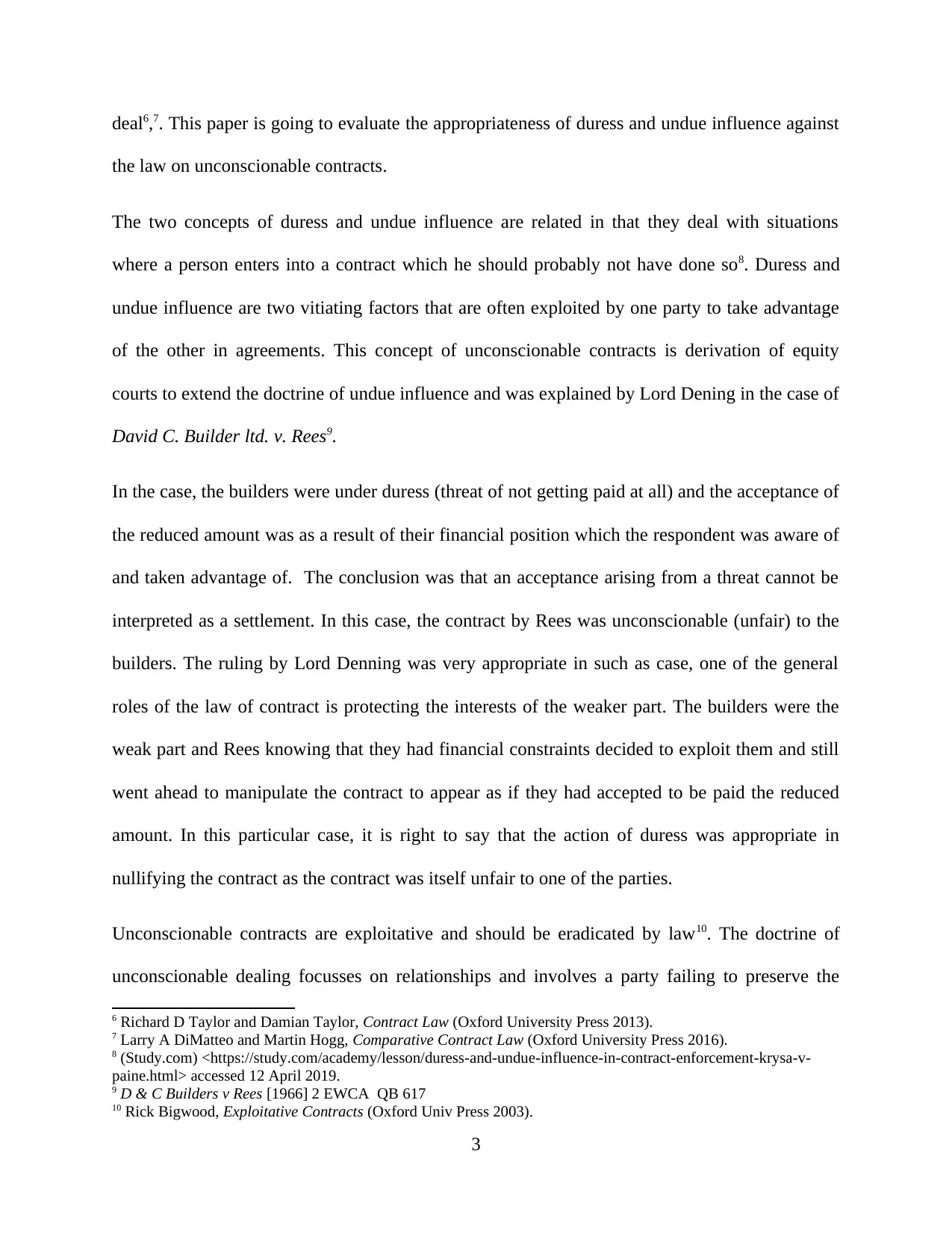
deal6,7. This paper is going to evaluate the appropriateness of duress and undue influence against
the law on unconscionable contracts.
The two concepts of duress and undue influence are related in that they deal with situations
where a person enters into a contract which he should probably not have done so8. Duress and
undue influence are two vitiating factors that are often exploited by one party to take advantage
of the other in agreements. This concept of unconscionable contracts is derivation of equity
courts to extend the doctrine of undue influence and was explained by Lord Dening in the case of
David C. Builder ltd. v. Rees9.
In the case, the builders were under duress (threat of not getting paid at all) and the acceptance of
the reduced amount was as a result of their financial position which the respondent was aware of
and taken advantage of. The conclusion was that an acceptance arising from a threat cannot be
interpreted as a settlement. In this case, the contract by Rees was unconscionable (unfair) to the
builders. The ruling by Lord Denning was very appropriate in such as case, one of the general
roles of the law of contract is protecting the interests of the weaker part. The builders were the
weak part and Rees knowing that they had financial constraints decided to exploit them and still
went ahead to manipulate the contract to appear as if they had accepted to be paid the reduced
amount. In this particular case, it is right to say that the action of duress was appropriate in
nullifying the contract as the contract was itself unfair to one of the parties.
Unconscionable contracts are exploitative and should be eradicated by law10. The doctrine of
unconscionable dealing focusses on relationships and involves a party failing to preserve the
6 Richard D Taylor and Damian Taylor, Contract Law (Oxford University Press 2013).
7 Larry A DiMatteo and Martin Hogg, Comparative Contract Law (Oxford University Press 2016).
8 (Study.com) <https://study.com/academy/lesson/duress-and-undue-influence-in-contract-enforcement-krysa-v-
paine.html> accessed 12 April 2019.
9 D & C Builders v Rees [1966] 2 EWCA QB 617
10 Rick Bigwood, Exploitative Contracts (Oxford Univ Press 2003).
3
the law on unconscionable contracts.
The two concepts of duress and undue influence are related in that they deal with situations
where a person enters into a contract which he should probably not have done so8. Duress and
undue influence are two vitiating factors that are often exploited by one party to take advantage
of the other in agreements. This concept of unconscionable contracts is derivation of equity
courts to extend the doctrine of undue influence and was explained by Lord Dening in the case of
David C. Builder ltd. v. Rees9.
In the case, the builders were under duress (threat of not getting paid at all) and the acceptance of
the reduced amount was as a result of their financial position which the respondent was aware of
and taken advantage of. The conclusion was that an acceptance arising from a threat cannot be
interpreted as a settlement. In this case, the contract by Rees was unconscionable (unfair) to the
builders. The ruling by Lord Denning was very appropriate in such as case, one of the general
roles of the law of contract is protecting the interests of the weaker part. The builders were the
weak part and Rees knowing that they had financial constraints decided to exploit them and still
went ahead to manipulate the contract to appear as if they had accepted to be paid the reduced
amount. In this particular case, it is right to say that the action of duress was appropriate in
nullifying the contract as the contract was itself unfair to one of the parties.
Unconscionable contracts are exploitative and should be eradicated by law10. The doctrine of
unconscionable dealing focusses on relationships and involves a party failing to preserve the
6 Richard D Taylor and Damian Taylor, Contract Law (Oxford University Press 2013).
7 Larry A DiMatteo and Martin Hogg, Comparative Contract Law (Oxford University Press 2016).
8 (Study.com) <https://study.com/academy/lesson/duress-and-undue-influence-in-contract-enforcement-krysa-v-
paine.html> accessed 12 April 2019.
9 D & C Builders v Rees [1966] 2 EWCA QB 617
10 Rick Bigwood, Exploitative Contracts (Oxford Univ Press 2003).
3
⊘ This is a preview!⊘
Do you want full access?
Subscribe today to unlock all pages.

Trusted by 1+ million students worldwide
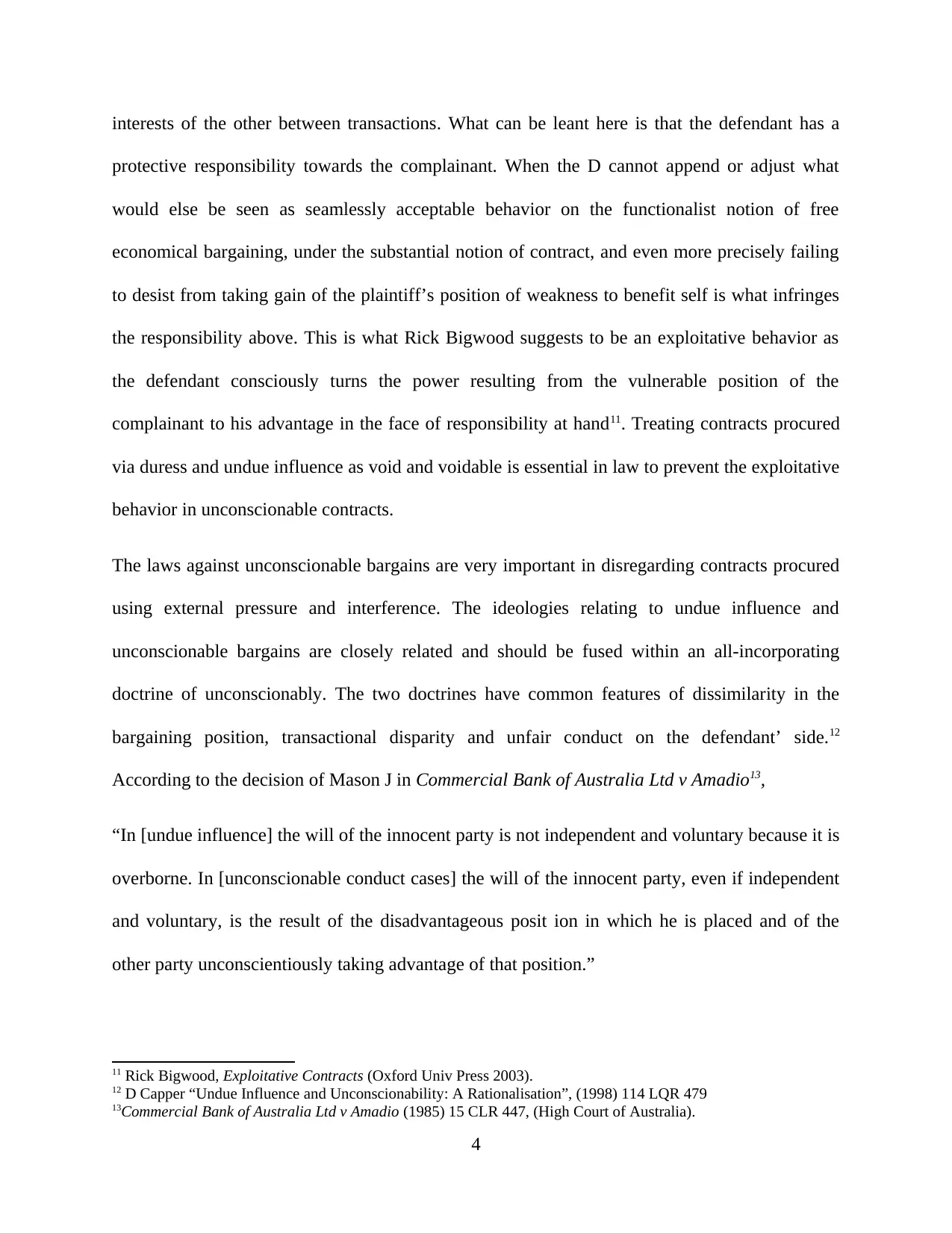
interests of the other between transactions. What can be leant here is that the defendant has a
protective responsibility towards the complainant. When the D cannot append or adjust what
would else be seen as seamlessly acceptable behavior on the functionalist notion of free
economical bargaining, under the substantial notion of contract, and even more precisely failing
to desist from taking gain of the plaintiff’s position of weakness to benefit self is what infringes
the responsibility above. This is what Rick Bigwood suggests to be an exploitative behavior as
the defendant consciously turns the power resulting from the vulnerable position of the
complainant to his advantage in the face of responsibility at hand11. Treating contracts procured
via duress and undue influence as void and voidable is essential in law to prevent the exploitative
behavior in unconscionable contracts.
The laws against unconscionable bargains are very important in disregarding contracts procured
using external pressure and interference. The ideologies relating to undue influence and
unconscionable bargains are closely related and should be fused within an all-incorporating
doctrine of unconscionably. The two doctrines have common features of dissimilarity in the
bargaining position, transactional disparity and unfair conduct on the defendant’ side.12
According to the decision of Mason J in Commercial Bank of Australia Ltd v Amadio13,
“In [undue influence] the will of the innocent party is not independent and voluntary because it is
overborne. In [unconscionable conduct cases] the will of the innocent party, even if independent
and voluntary, is the result of the disadvantageous posit ion in which he is placed and of the
other party unconscientiously taking advantage of that position.”
11 Rick Bigwood, Exploitative Contracts (Oxford Univ Press 2003).
12 D Capper “Undue Influence and Unconscionability: A Rationalisation”, (1998) 114 LQR 479
13Commercial Bank of Australia Ltd v Amadio (1985) 15 CLR 447, (High Court of Australia).
4
protective responsibility towards the complainant. When the D cannot append or adjust what
would else be seen as seamlessly acceptable behavior on the functionalist notion of free
economical bargaining, under the substantial notion of contract, and even more precisely failing
to desist from taking gain of the plaintiff’s position of weakness to benefit self is what infringes
the responsibility above. This is what Rick Bigwood suggests to be an exploitative behavior as
the defendant consciously turns the power resulting from the vulnerable position of the
complainant to his advantage in the face of responsibility at hand11. Treating contracts procured
via duress and undue influence as void and voidable is essential in law to prevent the exploitative
behavior in unconscionable contracts.
The laws against unconscionable bargains are very important in disregarding contracts procured
using external pressure and interference. The ideologies relating to undue influence and
unconscionable bargains are closely related and should be fused within an all-incorporating
doctrine of unconscionably. The two doctrines have common features of dissimilarity in the
bargaining position, transactional disparity and unfair conduct on the defendant’ side.12
According to the decision of Mason J in Commercial Bank of Australia Ltd v Amadio13,
“In [undue influence] the will of the innocent party is not independent and voluntary because it is
overborne. In [unconscionable conduct cases] the will of the innocent party, even if independent
and voluntary, is the result of the disadvantageous posit ion in which he is placed and of the
other party unconscientiously taking advantage of that position.”
11 Rick Bigwood, Exploitative Contracts (Oxford Univ Press 2003).
12 D Capper “Undue Influence and Unconscionability: A Rationalisation”, (1998) 114 LQR 479
13Commercial Bank of Australia Ltd v Amadio (1985) 15 CLR 447, (High Court of Australia).
4
Paraphrase This Document
Need a fresh take? Get an instant paraphrase of this document with our AI Paraphraser
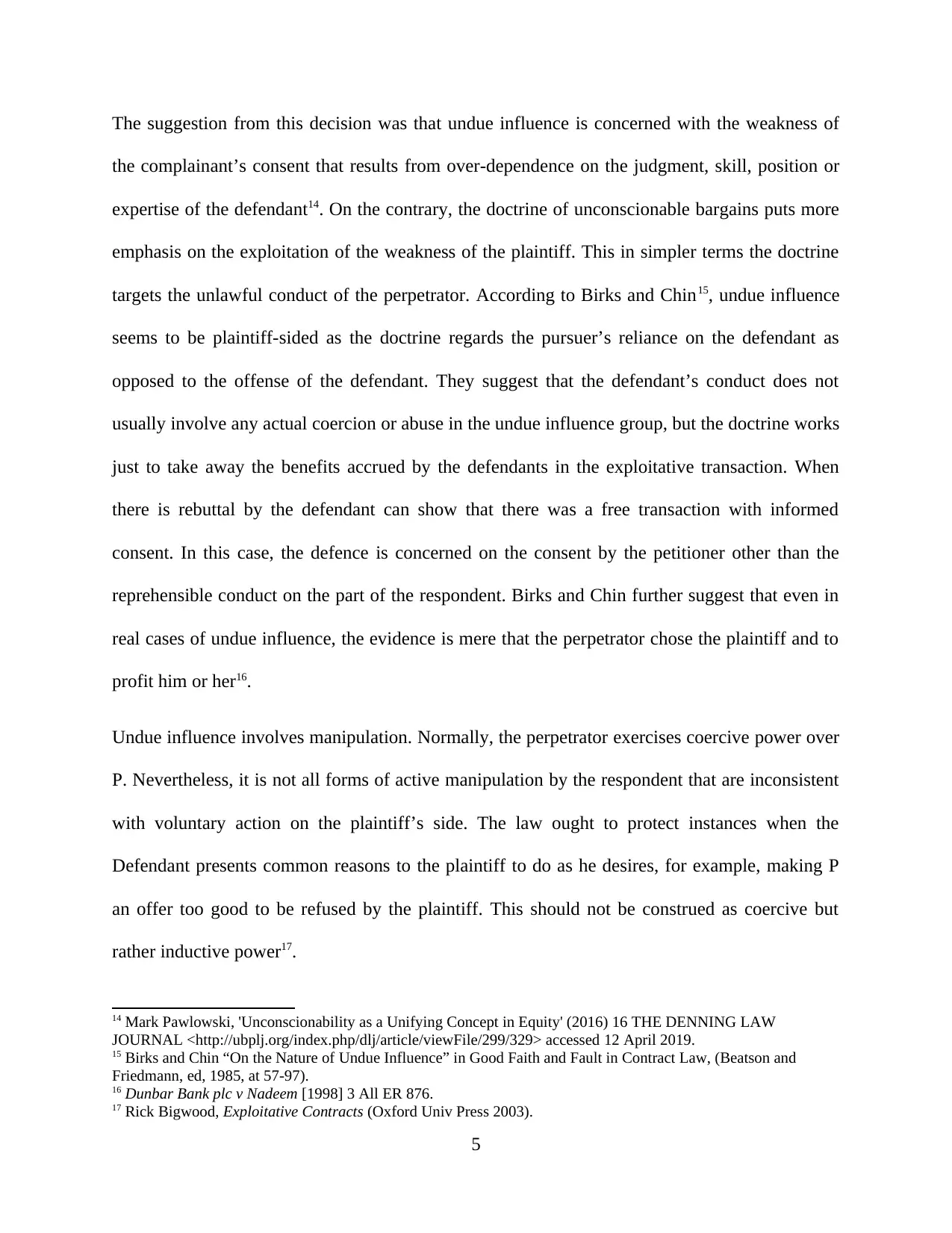
The suggestion from this decision was that undue influence is concerned with the weakness of
the complainant’s consent that results from over-dependence on the judgment, skill, position or
expertise of the defendant14. On the contrary, the doctrine of unconscionable bargains puts more
emphasis on the exploitation of the weakness of the plaintiff. This in simpler terms the doctrine
targets the unlawful conduct of the perpetrator. According to Birks and Chin15, undue influence
seems to be plaintiff-sided as the doctrine regards the pursuer’s reliance on the defendant as
opposed to the offense of the defendant. They suggest that the defendant’s conduct does not
usually involve any actual coercion or abuse in the undue influence group, but the doctrine works
just to take away the benefits accrued by the defendants in the exploitative transaction. When
there is rebuttal by the defendant can show that there was a free transaction with informed
consent. In this case, the defence is concerned on the consent by the petitioner other than the
reprehensible conduct on the part of the respondent. Birks and Chin further suggest that even in
real cases of undue influence, the evidence is mere that the perpetrator chose the plaintiff and to
profit him or her16.
Undue influence involves manipulation. Normally, the perpetrator exercises coercive power over
P. Nevertheless, it is not all forms of active manipulation by the respondent that are inconsistent
with voluntary action on the plaintiff’s side. The law ought to protect instances when the
Defendant presents common reasons to the plaintiff to do as he desires, for example, making P
an offer too good to be refused by the plaintiff. This should not be construed as coercive but
rather inductive power17.
14 Mark Pawlowski, 'Unconscionability as a Unifying Concept in Equity' (2016) 16 THE DENNING LAW
JOURNAL <http://ubplj.org/index.php/dlj/article/viewFile/299/329> accessed 12 April 2019.
15 Birks and Chin “On the Nature of Undue Influence” in Good Faith and Fault in Contract Law, (Beatson and
Friedmann, ed, 1985, at 57-97).
16 Dunbar Bank plc v Nadeem [1998] 3 All ER 876.
17 Rick Bigwood, Exploitative Contracts (Oxford Univ Press 2003).
5
the complainant’s consent that results from over-dependence on the judgment, skill, position or
expertise of the defendant14. On the contrary, the doctrine of unconscionable bargains puts more
emphasis on the exploitation of the weakness of the plaintiff. This in simpler terms the doctrine
targets the unlawful conduct of the perpetrator. According to Birks and Chin15, undue influence
seems to be plaintiff-sided as the doctrine regards the pursuer’s reliance on the defendant as
opposed to the offense of the defendant. They suggest that the defendant’s conduct does not
usually involve any actual coercion or abuse in the undue influence group, but the doctrine works
just to take away the benefits accrued by the defendants in the exploitative transaction. When
there is rebuttal by the defendant can show that there was a free transaction with informed
consent. In this case, the defence is concerned on the consent by the petitioner other than the
reprehensible conduct on the part of the respondent. Birks and Chin further suggest that even in
real cases of undue influence, the evidence is mere that the perpetrator chose the plaintiff and to
profit him or her16.
Undue influence involves manipulation. Normally, the perpetrator exercises coercive power over
P. Nevertheless, it is not all forms of active manipulation by the respondent that are inconsistent
with voluntary action on the plaintiff’s side. The law ought to protect instances when the
Defendant presents common reasons to the plaintiff to do as he desires, for example, making P
an offer too good to be refused by the plaintiff. This should not be construed as coercive but
rather inductive power17.
14 Mark Pawlowski, 'Unconscionability as a Unifying Concept in Equity' (2016) 16 THE DENNING LAW
JOURNAL <http://ubplj.org/index.php/dlj/article/viewFile/299/329> accessed 12 April 2019.
15 Birks and Chin “On the Nature of Undue Influence” in Good Faith and Fault in Contract Law, (Beatson and
Friedmann, ed, 1985, at 57-97).
16 Dunbar Bank plc v Nadeem [1998] 3 All ER 876.
17 Rick Bigwood, Exploitative Contracts (Oxford Univ Press 2003).
5
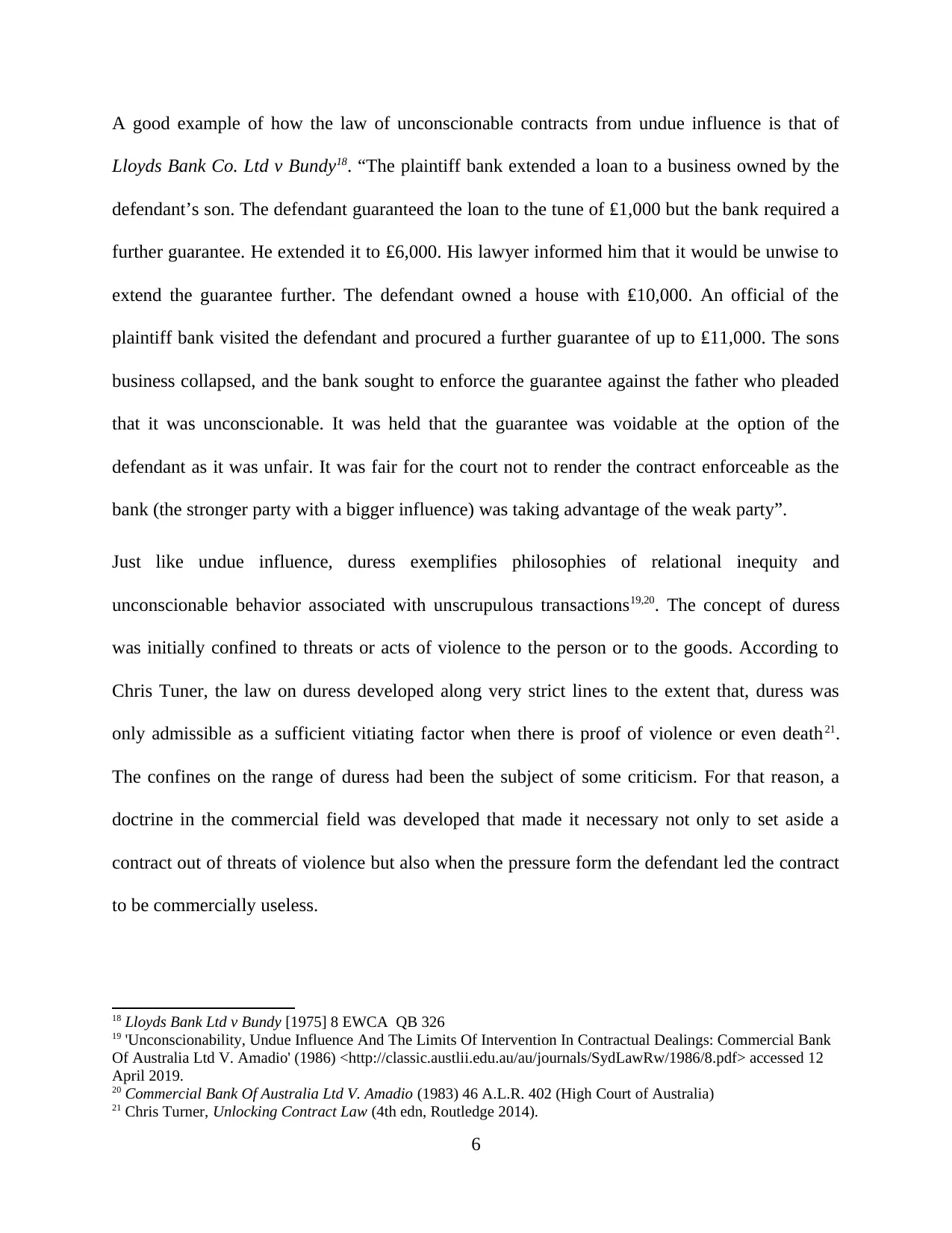
A good example of how the law of unconscionable contracts from undue influence is that of
Lloyds Bank Co. Ltd v Bundy18. “The plaintiff bank extended a loan to a business owned by the
defendant’s son. The defendant guaranteed the loan to the tune of ₤1,000 but the bank required a
further guarantee. He extended it to ₤6,000. His lawyer informed him that it would be unwise to
extend the guarantee further. The defendant owned a house with ₤10,000. An official of the
plaintiff bank visited the defendant and procured a further guarantee of up to ₤11,000. The sons
business collapsed, and the bank sought to enforce the guarantee against the father who pleaded
that it was unconscionable. It was held that the guarantee was voidable at the option of the
defendant as it was unfair. It was fair for the court not to render the contract enforceable as the
bank (the stronger party with a bigger influence) was taking advantage of the weak party”.
Just like undue influence, duress exemplifies philosophies of relational inequity and
unconscionable behavior associated with unscrupulous transactions19,20. The concept of duress
was initially confined to threats or acts of violence to the person or to the goods. According to
Chris Tuner, the law on duress developed along very strict lines to the extent that, duress was
only admissible as a sufficient vitiating factor when there is proof of violence or even death21.
The confines on the range of duress had been the subject of some criticism. For that reason, a
doctrine in the commercial field was developed that made it necessary not only to set aside a
contract out of threats of violence but also when the pressure form the defendant led the contract
to be commercially useless.
18 Lloyds Bank Ltd v Bundy [1975] 8 EWCA QB 326
19 'Unconscionability, Undue Influence And The Limits Of Intervention In Contractual Dealings: Commercial Bank
Of Australia Ltd V. Amadio' (1986) <http://classic.austlii.edu.au/au/journals/SydLawRw/1986/8.pdf> accessed 12
April 2019.
20 Commercial Bank Of Australia Ltd V. Amadio (1983) 46 A.L.R. 402 (High Court of Australia)
21 Chris Turner, Unlocking Contract Law (4th edn, Routledge 2014).
6
Lloyds Bank Co. Ltd v Bundy18. “The plaintiff bank extended a loan to a business owned by the
defendant’s son. The defendant guaranteed the loan to the tune of ₤1,000 but the bank required a
further guarantee. He extended it to ₤6,000. His lawyer informed him that it would be unwise to
extend the guarantee further. The defendant owned a house with ₤10,000. An official of the
plaintiff bank visited the defendant and procured a further guarantee of up to ₤11,000. The sons
business collapsed, and the bank sought to enforce the guarantee against the father who pleaded
that it was unconscionable. It was held that the guarantee was voidable at the option of the
defendant as it was unfair. It was fair for the court not to render the contract enforceable as the
bank (the stronger party with a bigger influence) was taking advantage of the weak party”.
Just like undue influence, duress exemplifies philosophies of relational inequity and
unconscionable behavior associated with unscrupulous transactions19,20. The concept of duress
was initially confined to threats or acts of violence to the person or to the goods. According to
Chris Tuner, the law on duress developed along very strict lines to the extent that, duress was
only admissible as a sufficient vitiating factor when there is proof of violence or even death21.
The confines on the range of duress had been the subject of some criticism. For that reason, a
doctrine in the commercial field was developed that made it necessary not only to set aside a
contract out of threats of violence but also when the pressure form the defendant led the contract
to be commercially useless.
18 Lloyds Bank Ltd v Bundy [1975] 8 EWCA QB 326
19 'Unconscionability, Undue Influence And The Limits Of Intervention In Contractual Dealings: Commercial Bank
Of Australia Ltd V. Amadio' (1986) <http://classic.austlii.edu.au/au/journals/SydLawRw/1986/8.pdf> accessed 12
April 2019.
20 Commercial Bank Of Australia Ltd V. Amadio (1983) 46 A.L.R. 402 (High Court of Australia)
21 Chris Turner, Unlocking Contract Law (4th edn, Routledge 2014).
6
⊘ This is a preview!⊘
Do you want full access?
Subscribe today to unlock all pages.

Trusted by 1+ million students worldwide
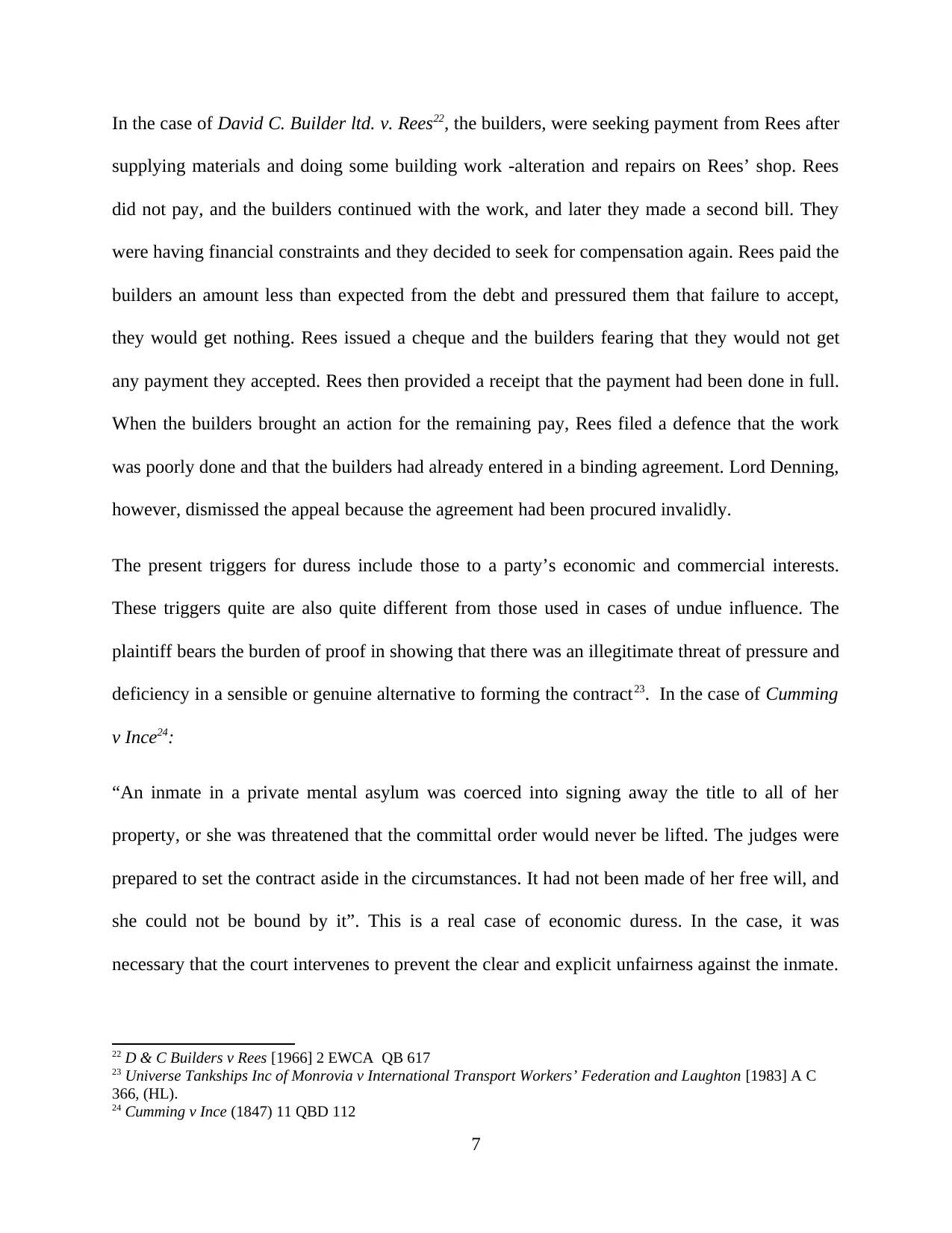
In the case of David C. Builder ltd. v. Rees22, the builders, were seeking payment from Rees after
supplying materials and doing some building work -alteration and repairs on Rees’ shop. Rees
did not pay, and the builders continued with the work, and later they made a second bill. They
were having financial constraints and they decided to seek for compensation again. Rees paid the
builders an amount less than expected from the debt and pressured them that failure to accept,
they would get nothing. Rees issued a cheque and the builders fearing that they would not get
any payment they accepted. Rees then provided a receipt that the payment had been done in full.
When the builders brought an action for the remaining pay, Rees filed a defence that the work
was poorly done and that the builders had already entered in a binding agreement. Lord Denning,
however, dismissed the appeal because the agreement had been procured invalidly.
The present triggers for duress include those to a party’s economic and commercial interests.
These triggers quite are also quite different from those used in cases of undue influence. The
plaintiff bears the burden of proof in showing that there was an illegitimate threat of pressure and
deficiency in a sensible or genuine alternative to forming the contract23. In the case of Cumming
v Ince24:
“An inmate in a private mental asylum was coerced into signing away the title to all of her
property, or she was threatened that the committal order would never be lifted. The judges were
prepared to set the contract aside in the circumstances. It had not been made of her free will, and
she could not be bound by it”. This is a real case of economic duress. In the case, it was
necessary that the court intervenes to prevent the clear and explicit unfairness against the inmate.
22 D & C Builders v Rees [1966] 2 EWCA QB 617
23 Universe Tankships Inc of Monrovia v International Transport Workers’ Federation and Laughton [1983] A C
366, (HL).
24 Cumming v Ince (1847) 11 QBD 112
7
supplying materials and doing some building work -alteration and repairs on Rees’ shop. Rees
did not pay, and the builders continued with the work, and later they made a second bill. They
were having financial constraints and they decided to seek for compensation again. Rees paid the
builders an amount less than expected from the debt and pressured them that failure to accept,
they would get nothing. Rees issued a cheque and the builders fearing that they would not get
any payment they accepted. Rees then provided a receipt that the payment had been done in full.
When the builders brought an action for the remaining pay, Rees filed a defence that the work
was poorly done and that the builders had already entered in a binding agreement. Lord Denning,
however, dismissed the appeal because the agreement had been procured invalidly.
The present triggers for duress include those to a party’s economic and commercial interests.
These triggers quite are also quite different from those used in cases of undue influence. The
plaintiff bears the burden of proof in showing that there was an illegitimate threat of pressure and
deficiency in a sensible or genuine alternative to forming the contract23. In the case of Cumming
v Ince24:
“An inmate in a private mental asylum was coerced into signing away the title to all of her
property, or she was threatened that the committal order would never be lifted. The judges were
prepared to set the contract aside in the circumstances. It had not been made of her free will, and
she could not be bound by it”. This is a real case of economic duress. In the case, it was
necessary that the court intervenes to prevent the clear and explicit unfairness against the inmate.
22 D & C Builders v Rees [1966] 2 EWCA QB 617
23 Universe Tankships Inc of Monrovia v International Transport Workers’ Federation and Laughton [1983] A C
366, (HL).
24 Cumming v Ince (1847) 11 QBD 112
7
Paraphrase This Document
Need a fresh take? Get an instant paraphrase of this document with our AI Paraphraser
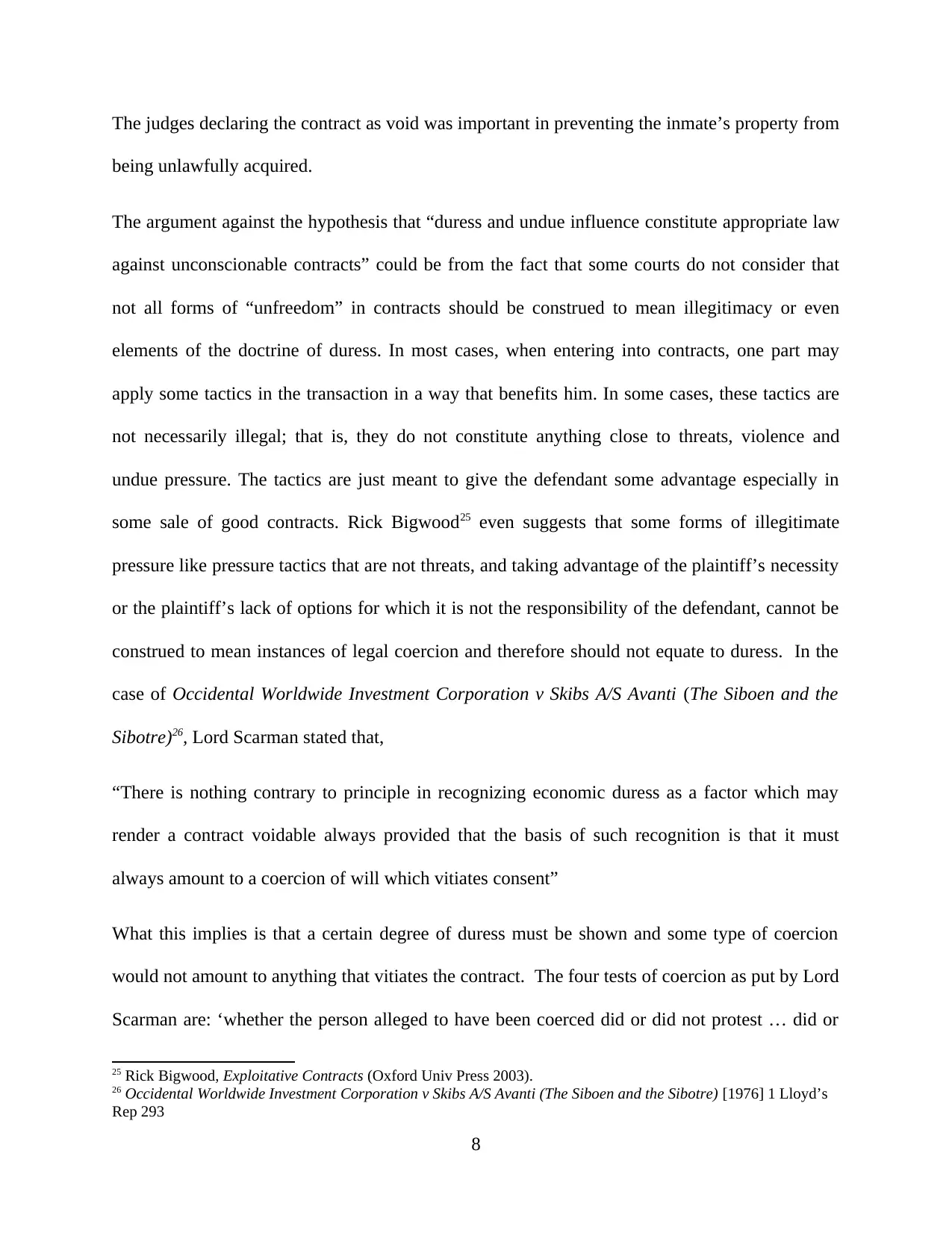
The judges declaring the contract as void was important in preventing the inmate’s property from
being unlawfully acquired.
The argument against the hypothesis that “duress and undue influence constitute appropriate law
against unconscionable contracts” could be from the fact that some courts do not consider that
not all forms of “unfreedom” in contracts should be construed to mean illegitimacy or even
elements of the doctrine of duress. In most cases, when entering into contracts, one part may
apply some tactics in the transaction in a way that benefits him. In some cases, these tactics are
not necessarily illegal; that is, they do not constitute anything close to threats, violence and
undue pressure. The tactics are just meant to give the defendant some advantage especially in
some sale of good contracts. Rick Bigwood25 even suggests that some forms of illegitimate
pressure like pressure tactics that are not threats, and taking advantage of the plaintiff’s necessity
or the plaintiff’s lack of options for which it is not the responsibility of the defendant, cannot be
construed to mean instances of legal coercion and therefore should not equate to duress. In the
case of Occidental Worldwide Investment Corporation v Skibs A/S Avanti (The Siboen and the
Sibotre)26, Lord Scarman stated that,
“There is nothing contrary to principle in recognizing economic duress as a factor which may
render a contract voidable always provided that the basis of such recognition is that it must
always amount to a coercion of will which vitiates consent”
What this implies is that a certain degree of duress must be shown and some type of coercion
would not amount to anything that vitiates the contract. The four tests of coercion as put by Lord
Scarman are: ‘whether the person alleged to have been coerced did or did not protest … did or
25 Rick Bigwood, Exploitative Contracts (Oxford Univ Press 2003).
26 Occidental Worldwide Investment Corporation v Skibs A/S Avanti (The Siboen and the Sibotre) [1976] 1 Lloyd’s
Rep 293
8
being unlawfully acquired.
The argument against the hypothesis that “duress and undue influence constitute appropriate law
against unconscionable contracts” could be from the fact that some courts do not consider that
not all forms of “unfreedom” in contracts should be construed to mean illegitimacy or even
elements of the doctrine of duress. In most cases, when entering into contracts, one part may
apply some tactics in the transaction in a way that benefits him. In some cases, these tactics are
not necessarily illegal; that is, they do not constitute anything close to threats, violence and
undue pressure. The tactics are just meant to give the defendant some advantage especially in
some sale of good contracts. Rick Bigwood25 even suggests that some forms of illegitimate
pressure like pressure tactics that are not threats, and taking advantage of the plaintiff’s necessity
or the plaintiff’s lack of options for which it is not the responsibility of the defendant, cannot be
construed to mean instances of legal coercion and therefore should not equate to duress. In the
case of Occidental Worldwide Investment Corporation v Skibs A/S Avanti (The Siboen and the
Sibotre)26, Lord Scarman stated that,
“There is nothing contrary to principle in recognizing economic duress as a factor which may
render a contract voidable always provided that the basis of such recognition is that it must
always amount to a coercion of will which vitiates consent”
What this implies is that a certain degree of duress must be shown and some type of coercion
would not amount to anything that vitiates the contract. The four tests of coercion as put by Lord
Scarman are: ‘whether the person alleged to have been coerced did or did not protest … did or
25 Rick Bigwood, Exploitative Contracts (Oxford Univ Press 2003).
26 Occidental Worldwide Investment Corporation v Skibs A/S Avanti (The Siboen and the Sibotre) [1976] 1 Lloyd’s
Rep 293
8
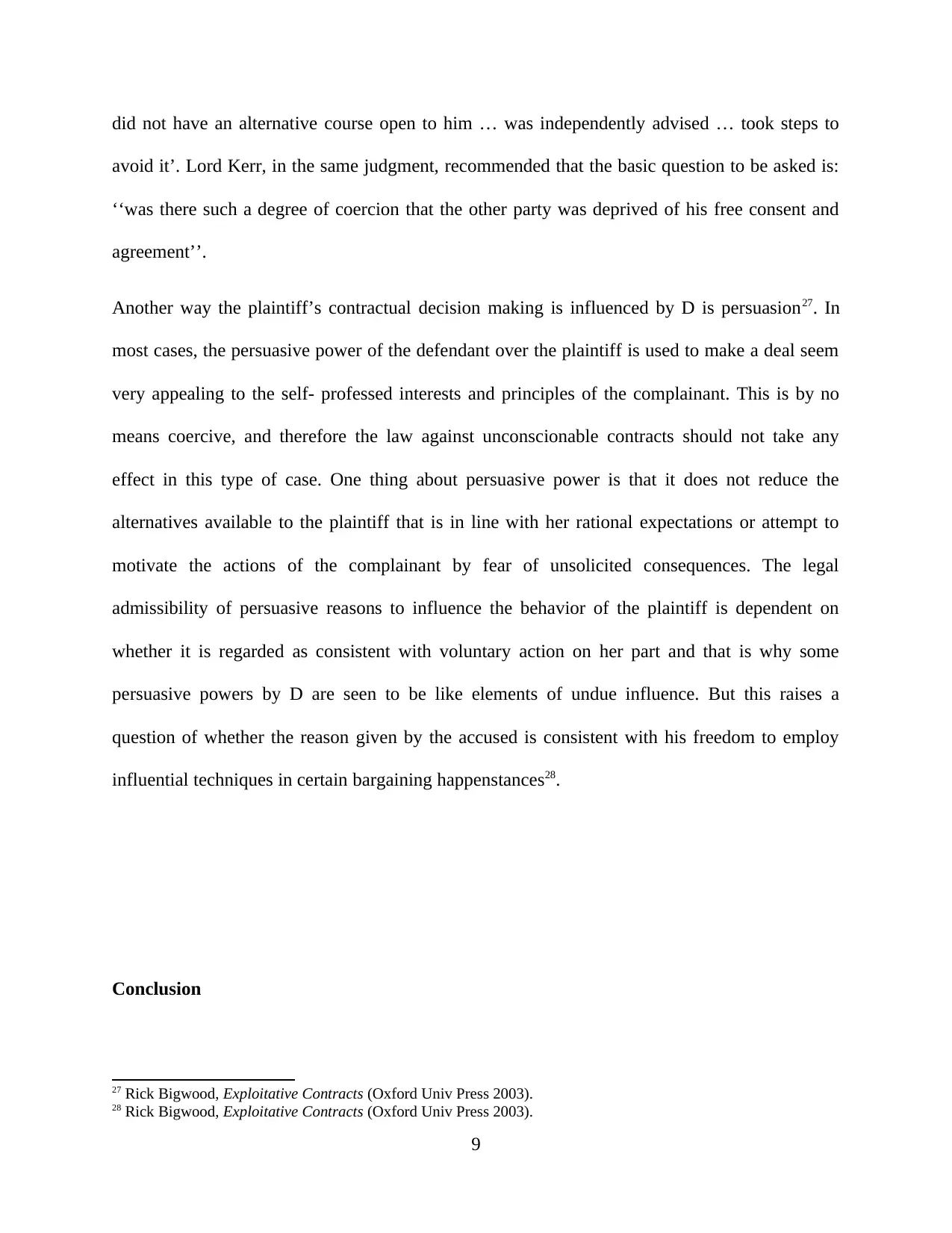
did not have an alternative course open to him … was independently advised … took steps to
avoid it’. Lord Kerr, in the same judgment, recommended that the basic question to be asked is:
‘‘was there such a degree of coercion that the other party was deprived of his free consent and
agreement’’.
Another way the plaintiff’s contractual decision making is influenced by D is persuasion27. In
most cases, the persuasive power of the defendant over the plaintiff is used to make a deal seem
very appealing to the self- professed interests and principles of the complainant. This is by no
means coercive, and therefore the law against unconscionable contracts should not take any
effect in this type of case. One thing about persuasive power is that it does not reduce the
alternatives available to the plaintiff that is in line with her rational expectations or attempt to
motivate the actions of the complainant by fear of unsolicited consequences. The legal
admissibility of persuasive reasons to influence the behavior of the plaintiff is dependent on
whether it is regarded as consistent with voluntary action on her part and that is why some
persuasive powers by D are seen to be like elements of undue influence. But this raises a
question of whether the reason given by the accused is consistent with his freedom to employ
influential techniques in certain bargaining happenstances28.
Conclusion
27 Rick Bigwood, Exploitative Contracts (Oxford Univ Press 2003).
28 Rick Bigwood, Exploitative Contracts (Oxford Univ Press 2003).
9
avoid it’. Lord Kerr, in the same judgment, recommended that the basic question to be asked is:
‘‘was there such a degree of coercion that the other party was deprived of his free consent and
agreement’’.
Another way the plaintiff’s contractual decision making is influenced by D is persuasion27. In
most cases, the persuasive power of the defendant over the plaintiff is used to make a deal seem
very appealing to the self- professed interests and principles of the complainant. This is by no
means coercive, and therefore the law against unconscionable contracts should not take any
effect in this type of case. One thing about persuasive power is that it does not reduce the
alternatives available to the plaintiff that is in line with her rational expectations or attempt to
motivate the actions of the complainant by fear of unsolicited consequences. The legal
admissibility of persuasive reasons to influence the behavior of the plaintiff is dependent on
whether it is regarded as consistent with voluntary action on her part and that is why some
persuasive powers by D are seen to be like elements of undue influence. But this raises a
question of whether the reason given by the accused is consistent with his freedom to employ
influential techniques in certain bargaining happenstances28.
Conclusion
27 Rick Bigwood, Exploitative Contracts (Oxford Univ Press 2003).
28 Rick Bigwood, Exploitative Contracts (Oxford Univ Press 2003).
9
⊘ This is a preview!⊘
Do you want full access?
Subscribe today to unlock all pages.

Trusted by 1+ million students worldwide
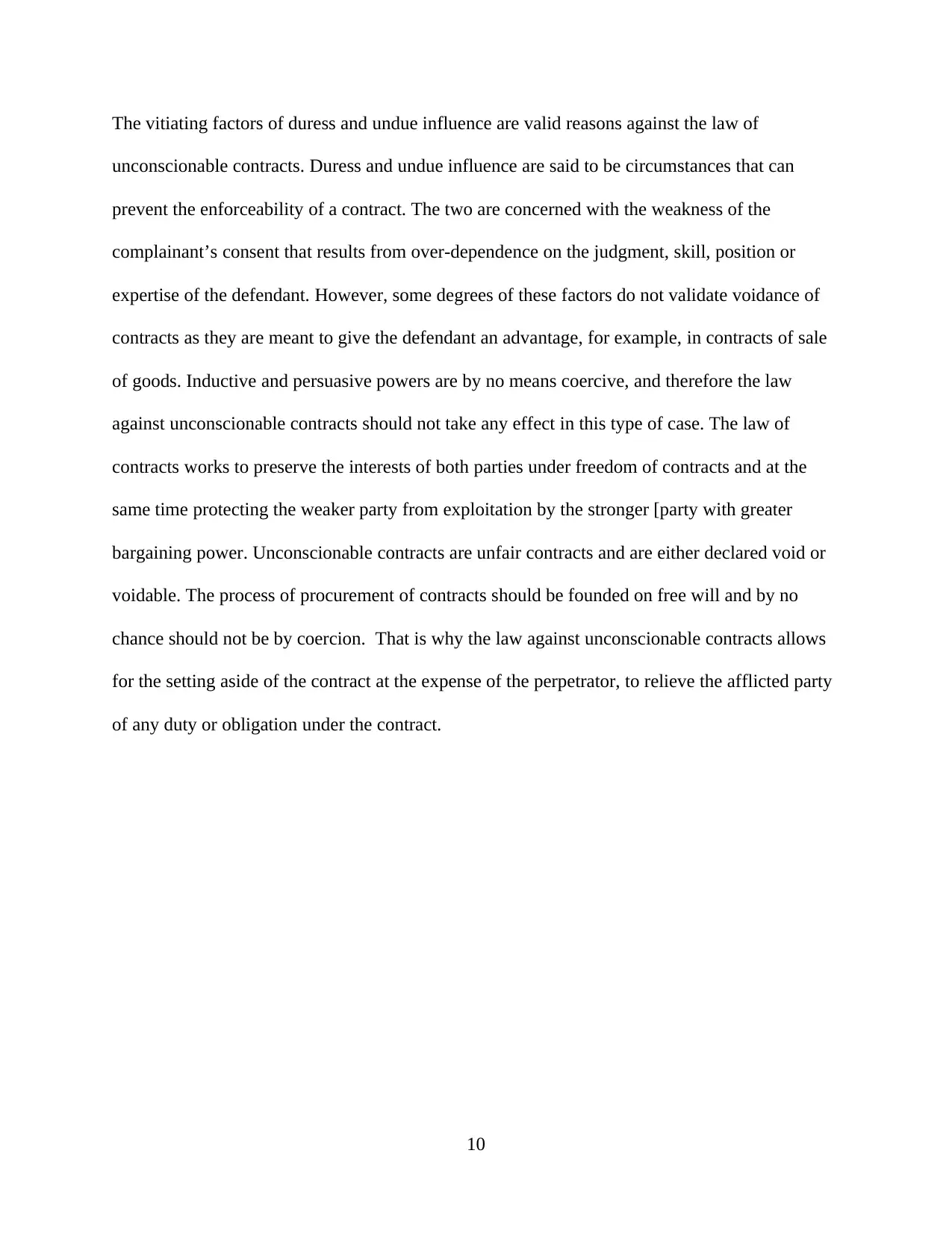
The vitiating factors of duress and undue influence are valid reasons against the law of
unconscionable contracts. Duress and undue influence are said to be circumstances that can
prevent the enforceability of a contract. The two are concerned with the weakness of the
complainant’s consent that results from over-dependence on the judgment, skill, position or
expertise of the defendant. However, some degrees of these factors do not validate voidance of
contracts as they are meant to give the defendant an advantage, for example, in contracts of sale
of goods. Inductive and persuasive powers are by no means coercive, and therefore the law
against unconscionable contracts should not take any effect in this type of case. The law of
contracts works to preserve the interests of both parties under freedom of contracts and at the
same time protecting the weaker party from exploitation by the stronger [party with greater
bargaining power. Unconscionable contracts are unfair contracts and are either declared void or
voidable. The process of procurement of contracts should be founded on free will and by no
chance should not be by coercion. That is why the law against unconscionable contracts allows
for the setting aside of the contract at the expense of the perpetrator, to relieve the afflicted party
of any duty or obligation under the contract.
10
unconscionable contracts. Duress and undue influence are said to be circumstances that can
prevent the enforceability of a contract. The two are concerned with the weakness of the
complainant’s consent that results from over-dependence on the judgment, skill, position or
expertise of the defendant. However, some degrees of these factors do not validate voidance of
contracts as they are meant to give the defendant an advantage, for example, in contracts of sale
of goods. Inductive and persuasive powers are by no means coercive, and therefore the law
against unconscionable contracts should not take any effect in this type of case. The law of
contracts works to preserve the interests of both parties under freedom of contracts and at the
same time protecting the weaker party from exploitation by the stronger [party with greater
bargaining power. Unconscionable contracts are unfair contracts and are either declared void or
voidable. The process of procurement of contracts should be founded on free will and by no
chance should not be by coercion. That is why the law against unconscionable contracts allows
for the setting aside of the contract at the expense of the perpetrator, to relieve the afflicted party
of any duty or obligation under the contract.
10
Paraphrase This Document
Need a fresh take? Get an instant paraphrase of this document with our AI Paraphraser
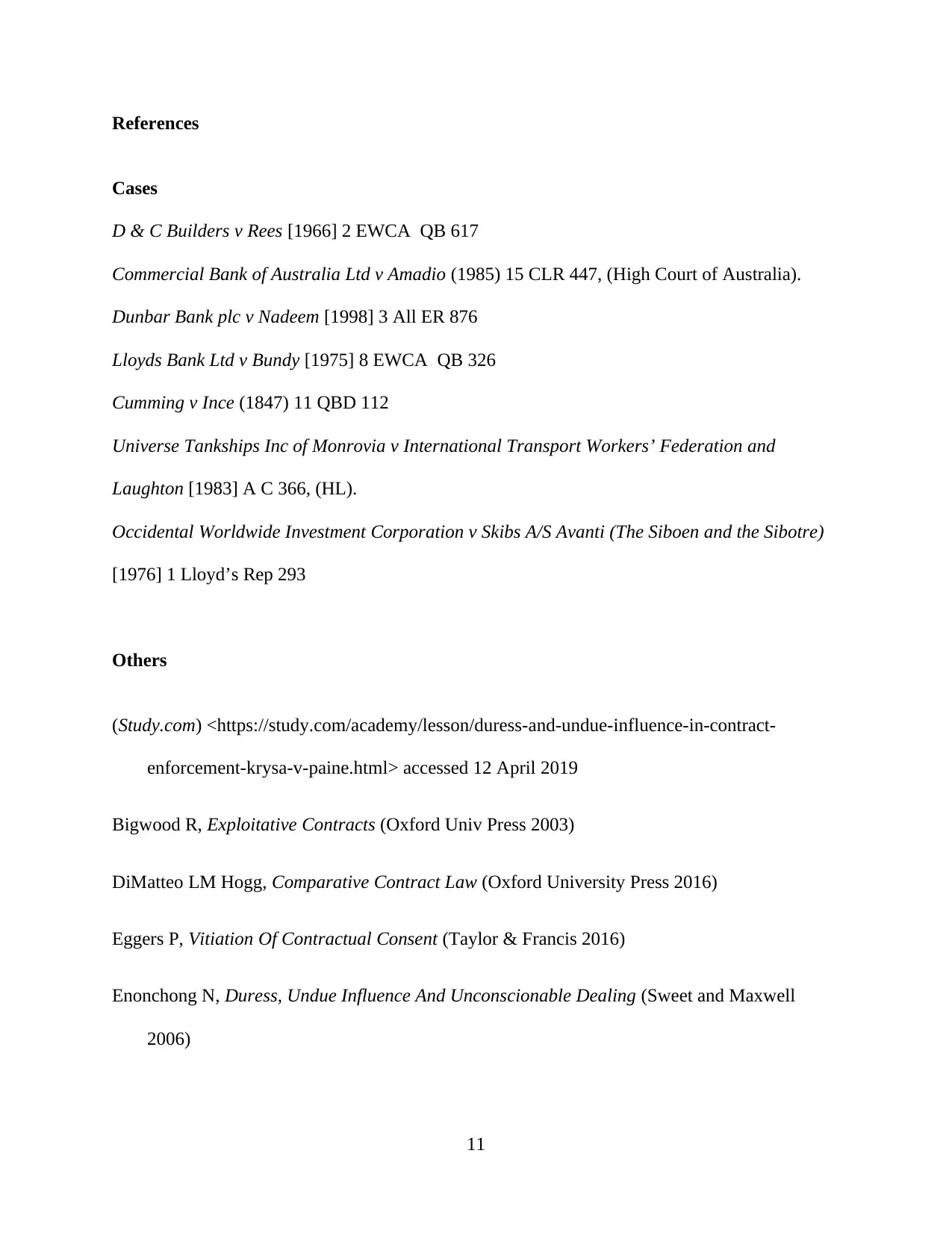
References
Cases
D & C Builders v Rees [1966] 2 EWCA QB 617
Commercial Bank of Australia Ltd v Amadio (1985) 15 CLR 447, (High Court of Australia).
Dunbar Bank plc v Nadeem [1998] 3 All ER 876
Lloyds Bank Ltd v Bundy [1975] 8 EWCA QB 326
Cumming v Ince (1847) 11 QBD 112
Universe Tankships Inc of Monrovia v International Transport Workers’ Federation and
Laughton [1983] A C 366, (HL).
Occidental Worldwide Investment Corporation v Skibs A/S Avanti (The Siboen and the Sibotre)
[1976] 1 Lloyd’s Rep 293
Others
(Study.com) <https://study.com/academy/lesson/duress-and-undue-influence-in-contract-
enforcement-krysa-v-paine.html> accessed 12 April 2019
Bigwood R, Exploitative Contracts (Oxford Univ Press 2003)
DiMatteo LM Hogg, Comparative Contract Law (Oxford University Press 2016)
Eggers P, Vitiation Of Contractual Consent (Taylor & Francis 2016)
Enonchong N, Duress, Undue Influence And Unconscionable Dealing (Sweet and Maxwell
2006)
11
Cases
D & C Builders v Rees [1966] 2 EWCA QB 617
Commercial Bank of Australia Ltd v Amadio (1985) 15 CLR 447, (High Court of Australia).
Dunbar Bank plc v Nadeem [1998] 3 All ER 876
Lloyds Bank Ltd v Bundy [1975] 8 EWCA QB 326
Cumming v Ince (1847) 11 QBD 112
Universe Tankships Inc of Monrovia v International Transport Workers’ Federation and
Laughton [1983] A C 366, (HL).
Occidental Worldwide Investment Corporation v Skibs A/S Avanti (The Siboen and the Sibotre)
[1976] 1 Lloyd’s Rep 293
Others
(Study.com) <https://study.com/academy/lesson/duress-and-undue-influence-in-contract-
enforcement-krysa-v-paine.html> accessed 12 April 2019
Bigwood R, Exploitative Contracts (Oxford Univ Press 2003)
DiMatteo LM Hogg, Comparative Contract Law (Oxford University Press 2016)
Eggers P, Vitiation Of Contractual Consent (Taylor & Francis 2016)
Enonchong N, Duress, Undue Influence And Unconscionable Dealing (Sweet and Maxwell
2006)
11
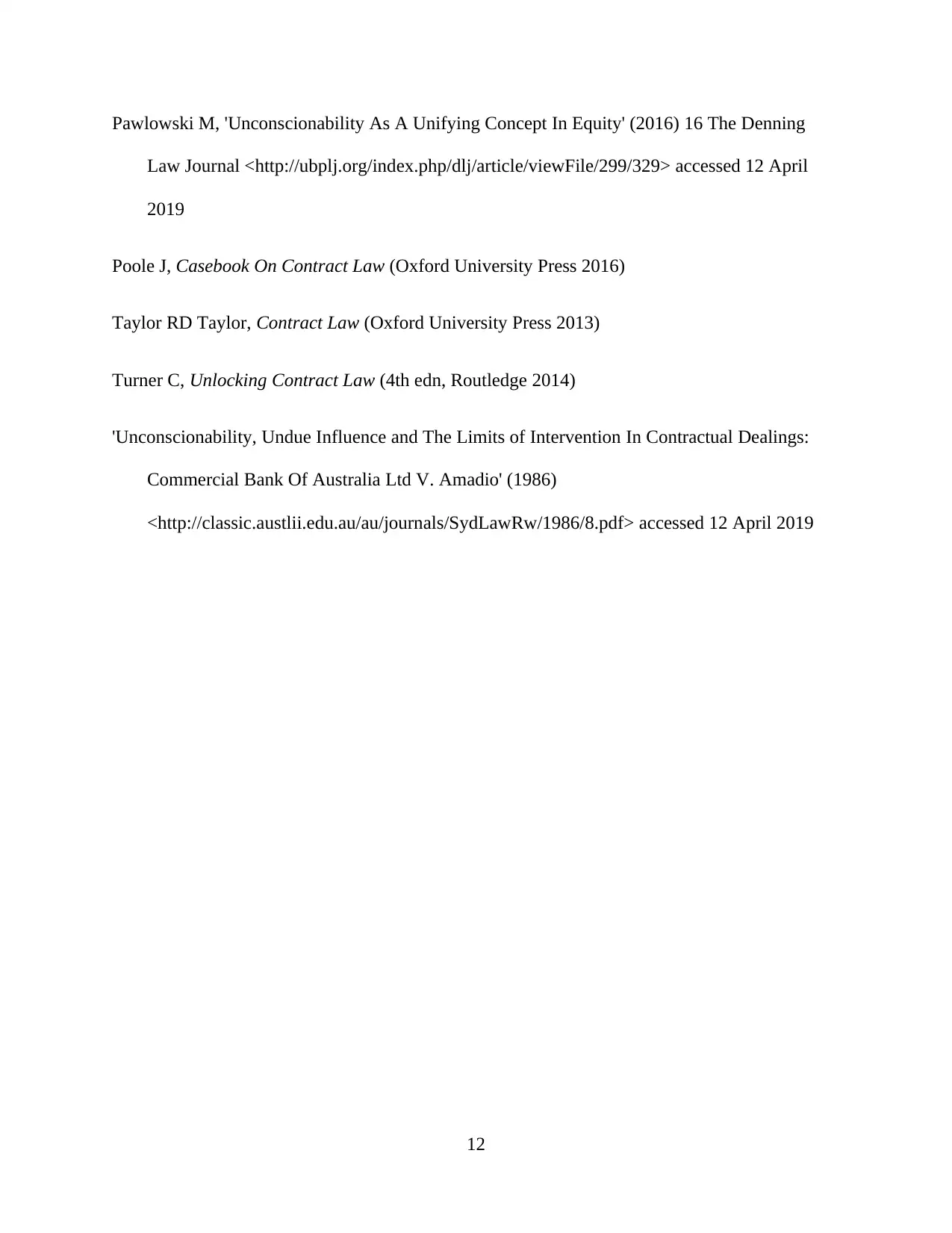
Pawlowski M, 'Unconscionability As A Unifying Concept In Equity' (2016) 16 The Denning
Law Journal <http://ubplj.org/index.php/dlj/article/viewFile/299/329> accessed 12 April
2019
Poole J, Casebook On Contract Law (Oxford University Press 2016)
Taylor RD Taylor, Contract Law (Oxford University Press 2013)
Turner C, Unlocking Contract Law (4th edn, Routledge 2014)
'Unconscionability, Undue Influence and The Limits of Intervention In Contractual Dealings:
Commercial Bank Of Australia Ltd V. Amadio' (1986)
<http://classic.austlii.edu.au/au/journals/SydLawRw/1986/8.pdf> accessed 12 April 2019
12
Law Journal <http://ubplj.org/index.php/dlj/article/viewFile/299/329> accessed 12 April
2019
Poole J, Casebook On Contract Law (Oxford University Press 2016)
Taylor RD Taylor, Contract Law (Oxford University Press 2013)
Turner C, Unlocking Contract Law (4th edn, Routledge 2014)
'Unconscionability, Undue Influence and The Limits of Intervention In Contractual Dealings:
Commercial Bank Of Australia Ltd V. Amadio' (1986)
<http://classic.austlii.edu.au/au/journals/SydLawRw/1986/8.pdf> accessed 12 April 2019
12
⊘ This is a preview!⊘
Do you want full access?
Subscribe today to unlock all pages.

Trusted by 1+ million students worldwide
1 out of 12
Related Documents
Your All-in-One AI-Powered Toolkit for Academic Success.
+13062052269
info@desklib.com
Available 24*7 on WhatsApp / Email
![[object Object]](/_next/static/media/star-bottom.7253800d.svg)
Unlock your academic potential
Copyright © 2020–2026 A2Z Services. All Rights Reserved. Developed and managed by ZUCOL.




